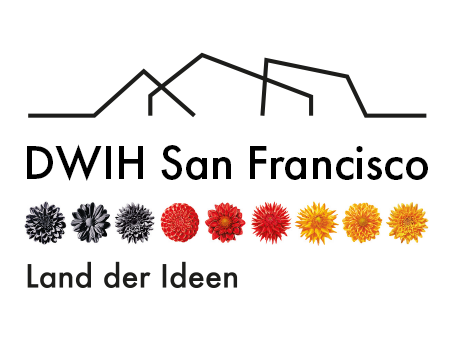Roundtable for Entrepreneurship & Research in the Life Sciences
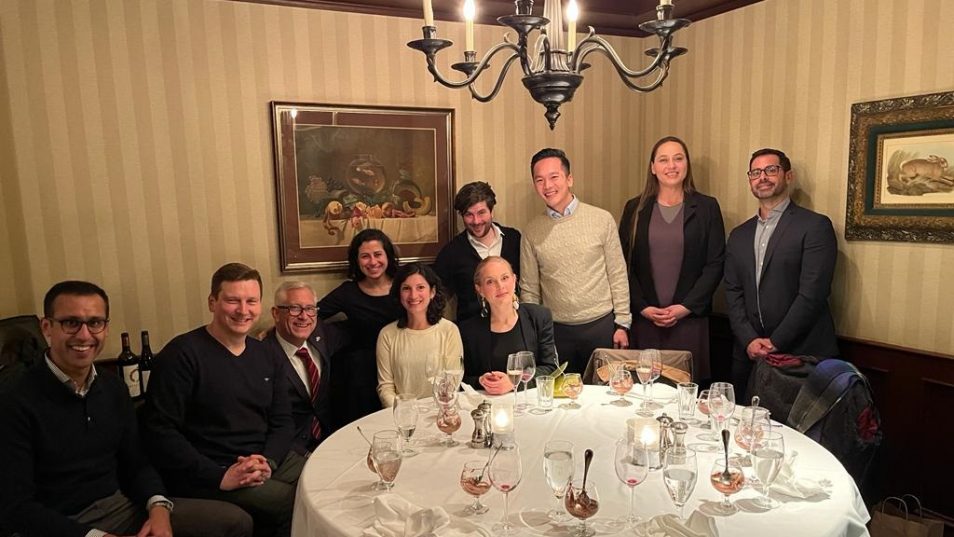
Das Deutsche Wissenschafts- und Innovationshaus (DWIH) San Francisco veranstaltete am Dienstag, den 7. März 2023, einen Roundtable mit dem Staatssekretär des Bundesministeriums für Bildung und Forschung (BMBF), Mario Brandenburg, zum Thema Entrepreneurship & Research in Life Sciences.
Wie können in Deutschland Spin-Offs aus den Life Sciences durch bessere politische Rahmenbedingungen gefördert werden? Wie fördert das Innovationsökosystem in der Bay Area die Biotechnologie? Wer sollte die Verantwortung für Innovationen tragen?
Life-Science-Ventures sind mit einem hohen Maß an wissenschaftlicher, klinischer und kommerzieller Unsicherheit konfrontiert, und diese Unsicherheiten bieten viele Möglichkeiten für unternehmerische Innovation. Wichtig ist, unternehmerische Möglichkeiten in den Biowissenschaften zu erkunden, einschließlich der Erforschung von Ideen, der Generierung und / oder Lizenzierung von geistigem Eigentum, Geschäftsmodellen, der Bereitstellung von Unternehmungen mit den entsprechenden finanziellen und personellen Ressourcen und der Skalierung.
Welche Bereiche der Biowissenschaften sind reif für Innovation und Unternehmertum?
Thematisch betrachtet liegt unternehmerisches Potenzial u.a. in der Pharmaindustrie und Biotechnologie, in der Entwicklung medizinischer Geräte sowie verwandte Themen wie digitale Therapeutika, Plattformtechnologien, Nutzung von Beweisen aus der Praxis, Informatik in der Medizin und die Rolle von dezentralen klinischen Studien.
Zu diesen und weiteren Fragen und Themen hat das DWIH San Francisco ausgewählte Experten zu einem Roundtable eingeladen, um Verbindungen zwischen der deutschen Politik und den führenden Biotech-Unternehmen und Wissenschaftlern in der Bay Area herzustellen.
Über die Fragen der Implementierung von Innovationen hinaus ging es auch fachlich in die Tiefe:
StS Brandenburg bekundete im Vorfeld sein Interesse an CRISPR (eine u.a. an der UC Berkeley entwickelte Technologie, mit der Forscher die DNA lebender Organismen selektiv verändern) und die damit verbundenen ethischen Fragestellungen. Einer der Teilnahmer war der Biomediziner und DAAD-Alumnus Dr. Enrique Lin Shiao, der in den Bereichen Geneditierung im Labor von Dr. Jennifer A. Doudna, Nobelpreisträgerin für Chemie 2020 mitgewirkt hat. Heute arbeitet er als Venture Capital Investor in der Biotechnologie und konnte seine Erfahrungen aus der Schnittstelle zwischen Entrepreneurship und Lebenswissenschaften teilen.
Dr. Hedi Razavi, Managing Director bei German Entrepreneurship, dessen bekanntestes Projekt German Accelerator ist, hat die Expertenrunde durch ihre Erfahrungen bereichert: Hedi lebte vor ihrer unternehmerischen Tätigkeit in Deutschland, während sie ein globales Team im St. Jude Medical vom weltbekannten Herzzentrum in Leipzig leitete. Sie arbeitete an der Entwicklung KI-fähigen Produkten für Patienten mit Herzinsuffizienz, was zu 25 Patenten und zahlreichen von Experten begutachteten Zeitschriftenveröffentlichungen führte. Hedi absolvierte ihren M.S. und PhD in Bioengineering in Stanford als Stipendiatin der National Science Foundation. In der Diskussion konnte sie ihre Kenntnisse aus beiden Systemen in Deutschland und in den USA wie auch aus der Forschung und Industrie einbringen. Ein Ergebnis der Diskussionen war, dass in Deutschland eine stärkere Verbindung zwischen Industrie und Hochschulen sich innovationsfördernd auswirken würde: Die Industrie bietet Kapital und Wissen aus der Anwendung, das viel enger und früher mit der Forschung verknüpft werden sollte.
Ein online Follow Up mit StS Brandenburg soll nun konkrete Handlungsansätze modifizieren.

Teilnehmer (auf Englisch)
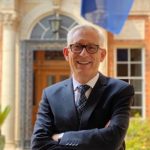
Oliver Schramm heads the German Consulate General in San Francisco. From 2017-2021 he served as Minister for Economic and Global Affairs at the German Embassy in London. From 2014-2017, he served at the Federal Ministry of Foreign Affairs in Berlin as the Head of Division for German Schools Abroad and International Sports Cooperation. His various roles within the Federal Ministry of Foreign Affairs have stationed him in Seoul, Boston, Washington/DC, Rome, Lima and London. Oliver began his professional career in 1991 working first in the Political Department of the Ministry of Foreign Affairs in Bonn and then in the Federal Chancellery as a member of the Chancellor's speech-writing group from 1995-98. He studied at Harvard from 2001-2002 and received an MPA from Harvard's Kennedy School of Government.Oliver Schramm
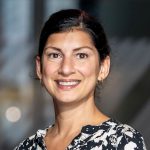
Zahar Barth-Manzoori is the Director of the German Center for Research and Innovation (DWIH) in San Francisco. After completing her doctorate in Middle Eastern Studies at the Christian-Albrechts-Universität zu Kiel – supported by a scholarship from the German Academic Scholarship Foundation – she began working at the DAAD in Bonn in 2011 as head of the Events and Visitor Programs Department. In 2015, she took over the position as Head of Section Joint Scholarship Programs Middle East, North Africa, returning to her professional roots. From May 2020 until her departure for San Francisco, she played a leading role in setting up DWIH San Francisco as head of the DWIH management office at DAAD. As an experienced science manager and passionate networker, she is particularly looking forward to initiating international university collaborations, fostering knowledge transfer between research, business and society, and supporting research-based innovation in San Francisco.Zahar Barth-Manzoori
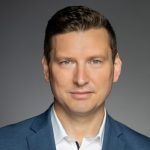
Mario Brandenburg was appointed Parliamentary State Secretary to the Federal Minister of Education and Research in June 2022. Mario Brandenburg has been a member of the German Bundestag since 2017. During the 19th legislative period (2017 to 2021), he served as spokesperson of the Free Democratic Party for technology policy and represented his party on the Committee on Education, Research and Technology Assessment, on the Committee on the Digital Agenda and on the Study Commission on Artificial Intelligence. In the 20th legislative period (2021 to 2025), Mr Brandenburg was appointed spokesperson of the Free Democratic Party in the German Bundestag for research, technology and innovation and sat on the Committee on Education, Research and Technology Assessment. Mr Brandenburg has an M.Sc. in business informatics. In 2009, he was recruited by Europe's largest software company, SAP SE, where he worked until 2017, starting as a working student covering various positions before working as a cloud integration architect and consultant. Mr Brandenburg joined the FDP in 2010 and was elected to the local council and the collective municipality council in Rülzheim, Rhineland-Palatinate in 2014.Mario Brandenburg
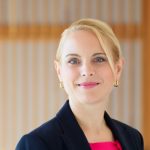
Julia Schaletzky joined UC Berkeley's Center for Emerging and Neglected Diseases in fall 2017 and is currently the center’s Executive Director. Originally from Germany, Julia trained as a Biochemist at Bayreuth University and completed her studies in the laboratory of Prof. Francis Barr at the Max-Planck-Institute of Biochemistry in Martinsried, Germany. She then went abroad to obtain her PhD in the laboratory of Prof. Tom Rapoport at Harvard Medical School/HHMI. While the main focus was on translocation of proteins across the endoplasmic reticulum membrane, she also volunteered as a mentor for the HHMI EXROP program, training and mentoring students from underrepresented communities over the summer. After completing her PhD, Julia joined Cytokinetics, a biotechnology company in South San Francisco. During her 11 years at Cytokinetics, Julia and her team focused on discovering and developing novel, first-in-class medicines against heart failure and neurodegenerative disorders such as ALS, which are currently in Phase III clinical trials. In addition, she took on several pro-bono projects stemming from academic collaborations, working after hours on successful screens against Trypanosomiasis (sleeping sickness), Malaria and Toxoplasmosis. Julia is passionate about treating neglected and emerging diseases, establishing effective collaboration between academia and industry and about translating basic science into new companies and ultimately cures. In her free time, Julia enjoys learning new skills, socializing with family and friends, and practicing the Arts.Julia Schaletzky
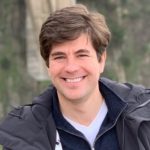
Mark H. Michalski is a physician with 15+ years of experience at the intersection of medical technology, data science, devices, and clinical medicine. He c He has most recently served as founding Executive Director of the Center for Clinical Data Science (CCDS) at Massachusetts General Hospital and Brigham and Women’s Hospital, and as faculty at Harvard Medical School.A unique, product-focused organization empowered to leverage the data resources of both hospitals, and backed by multiple corporate partners (NVidia, GE, Nuance, FujiFilm), the CCDS has co-developed products for nearly every clinical specialty, as well as non-clinical solutions in operations and population risk management.Before this role, Dr. Michalski served as president and CMO of Butterfly Network and was founding CMO and commercial lead for Hyperfine Research. He has conducted research focused on machine learning, medical 3-D printing, and molecular diagnostics, has published in journals such as JAMA, PLOS, and PNAS, and has given over 80 invited talks. Previous to these roles, Dr. Michalski worked in various technology and strategy groups at Genentech and Google. He completed his diagnostic radiology residency as a Holman fellow at Yale, his medical degree at Stanford, and a BS in Cybernetics at UCLA.Mark Michalski
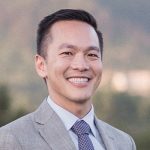
Enrique Lin Shiao is senior associate, Venture Investments at the Cystic Fibrosis Foundation, a biomedical scientist working in the Investments Department at CFF, identifying, evaluating and investing in novel genetic and delivery technologies towards a cure for cystic fibrosis. CFF is a highly active venture capital investor, we have a $5B endowment and a $600M+ commitment to venture investments with a target allocation by 2025. We support a wide array of biotech companies. Strategic focus on gene editing, gene transfer, and gene delivery technologies. He previously worked in asset acquisitions at BridgeBio Pharma, sourcing, evaluating and moving therapies for rare genetic diseases and oncology from the bench to patients. Prior to that, he trained as a biomedical scientist for 12+ years working in research spanning gene editing (in the lab of Dr. Jennifer A. Doudna, Nobel Prize in Chemistry 2020), genetic and epigenetic mechanisms in disease, cancer immunotherapy, drug discovery and technology developmentEnrique Lin Shiao
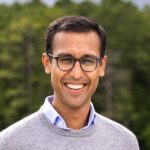
Mridul Agrawal is a physician, scientist, and healthcare entrepreneur dedicated to advancing the care for cancer patients. He is President and co-founder of iuvando Health, a Germany-based, innovative digital health and precision oncology company, that enables patients with cancer to find and access life-saving treatments within clinical trials. Prior, Dr. Agrawal was a research fellow at Dana-Farber Cancer Institute, Harvard Medical School, and the Broad Institute of MIT and Harvard with a focus on blood cancer. Dr. Agrawal studied medicine at Johns Hopkins University School of Medicine (Baltimore), University of Zurich, and Heidelberg University, where he graduated with a doctorate degree. He also obtained a master’s degree in Health Economics from Heidelberg University. Dr. Agrawal was a scholar of the German Academic Scholarship Foundation (Studienstiftung des deutschen Volkes). He has been honored with multiple highly prestigious national and international awards both in his role as a physician-scientist and entrepreneur.Mridul Agrawal
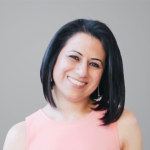
Hedi Razavi is an entrepreneur, business leader, advisor, and technologist with a passion for building impactful ventures. She is currently the managing partner at German Entrepreneurship and leads the Artificial Intelligence (AI) Competence Center with a mission to enable the adoption, expansion, and internationalization of AI technologies and products developed in Germany. Previously, Hedi was the director of products at C3 AI, the leading provider of enterprise AI solutions, and managed various AI enterprise products. Prior to that, she co-founded and led a Silicon Valley AI+IoT company, Keewi Inc., from idea to exit and focused on transforming electrical outlets to powerful sensors that render the built space more environmentally efficient. Hedi lived in Germany before her entrepreneurial endeavor while leading a global team at St. Jude Medical from the world-renowned Heart Center in Leipzig, Germany. She worked on developing AI-enabled products for heart failure patients resulting in 25 patents and numerous peer-reviewed journal publications. Hedi completed her M.S. and PhD in Bioengineering at Stanford as a National Science Foundation Fellow and a Siebel Scholar. She received her BS in Bioengineering from the University of California at Berkeley as the recipient of the departmental citation award, the highest honor bestowed upon a student in recognition of distinguished work.Hedi Razavi
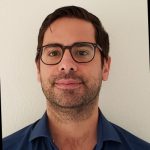
Danilo Maddalo is currently a group leader at Genentech (South San Francisco, USA) where he focuses on in vivo pharmacology, translational research and genome editing. He obtained a degree in Pharmaceutical Chemistry with honors from the University of Naples (Italy) ‘Federico II’ before moving to Karlsruhe (Germany) where he carried his PhD studies in Biochemistry and Molecular Biology (with honors) focusing on the role of molecular chaperones in cancer. Thereafter he was awarded a grant as Young Investigator from the Helmholtz Society to investigate the impact of cell stress on tumor growth and response to chemotherapy. To further specialize in mouse modeling, he moved to New York City (USA) at Memorial Sloan Kettering Cancer Center where he established a model of chromosomal rearrangements using the CRISPR/Cas9 technology. Before moving to Genentech, Dr. Maddalo was a group leader at the Novartis Institutes for Biomedical Research in Basel (Switzerland) to focus on mouse modeling of disease for drug discovery and target identification in oncology.Danilo Maddalo

Beate Antonich is Senior Advisor for Science and Technology at the German Consulate General in San Francisco. An Expert Reviewer of the IPCC WGIII Sixth Assessment Report, she focuses in the Pacific Northwest on climate technology and innovation. Her academic and policy-oriented path lead her from sifting through legislation, policy implementations and disputes to international negotiations of free trade and multilateral environmental agreements.Beate Antonich
